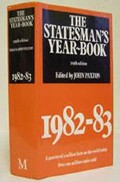Abstract
HISTORY. From the 16th century to 1959 the Tutsi kingdom of Rwanda shared the history of Burundi (see p. 259). In 1959 an uprising of the Hutu destroyed the Tutsi feudal hierarchy and led to the departure of the Mwami Kigeri V. Elections and a referendum under the auspices of the United Nations in Sept. 1961 resulted in an overwhelming majority for the republican party, the Parmehutu (Parti du Mouvement de l’Emancipation du Bahutu), and the rejection of the institution of the Mwami. The republic proclaimed by the Parmehutu on 28 Jan. 1961 was recognized by the Belgian administration (but not by the United Nations) in Oct. 1961. Internal self-government was granted on 1 Jan. 1962, and by decision of the General Assembly of the UN the Republic of Rwanda became independent on 1 July 1962. An agreement, signed with Burundi under United Nations auspices at Addis Ababa in April 1962, provided for a monetary and customs union. These and other common organizations came to an end by 1 Oct. 1964.
Access this chapter
Tax calculation will be finalised at checkout
Purchases are for personal use only
Books of Reference
Hance, W. A., African Economic Development. London, 1967
Lacroix, B., Le Rwanda. Montreal, 1966
Nortnumb, D., Un Humanisme Africain. Brussels, 1965
Editor information
Copyright information
© 1982 Palgrave Macmillan, a division of Macmillan Publishers Limited
About this chapter
Cite this chapter
Paxton, J. (1982). Rwanda. In: Paxton, J. (eds) The Statesman’s Year-Book. The Statesman’s Yearbook. Palgrave Macmillan, London. https://doi.org/10.1057/9780230271111_133
Download citation
DOI: https://doi.org/10.1057/9780230271111_133
Publisher Name: Palgrave Macmillan, London
Online ISBN: 978-0-230-27111-1
eBook Packages: Palgrave Political & Intern. Studies CollectionPolitical Science and International Studies (R0)

